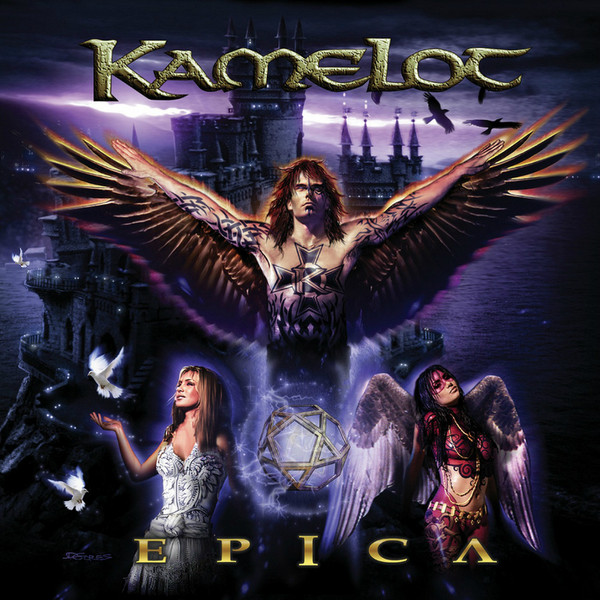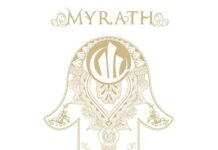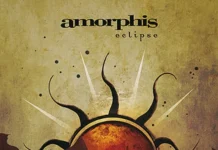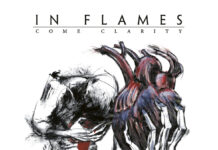With a new KAMELOT album, “The Awakening,” coming out later this month, on the 17th to be more precise, it’s a good time to look back on the band’s rich legacy and celebrate the 20th anniversary of the beloved “Epica.” This highly praised concept album, the first part of their rock opera inspired by Goethe’s Faust, came out on March 3rd, 2003, through Noise Records.

Listening to this record and its sequel, “The Black Halo” (2005), it is easy to understand not just why KAMELOT have become such a revered band in the metal scene, but also why this pair of albums gained an almost untouchable cult status in their discography. Everything from the lyrics and dramatic orchestrations to Roy Khan’s vocal performance, Thomas Youngblood’s stellar guitar work, and the smooth flow of the music through various interludes is as perfect as can be, beautifully bringing the first part of Ariel’s story to life. No wonder “Epica” was, and still is, considered one of the best power metal albums of all time. It bears mentioning that this is KAMLEOT’s first concept album and they pulled it off with flying colors.
Allow me to set the scene: God and the rebellious Mephisto have an ongoing bet – if Mephisto can claim the soul of Ariel (representing Faust in Goethe’s original version), then he can return to Heaven. If not, then Hell awaits Mephisto. So, it’s quite a layered and complex story with many supernatural elements at play and philosophical questions to ponder. As far as concept records go, the story they tell is everything, so it’s not surprising that this tale of love (“On the Coldest Winter Night”), temptation (“Descent of the Archangel”), vanity (“A Feast for the Vain”), and a quest for answers (“Farewell”) is still as enchanting now as it was in 2003. However, it wouldn’t be half as successful if not for two key elements: well-written lyrics that can properly chronicle Ariel’s thoughts, as well as Mephisto’s actions; and well-delivered vocals that can convincingly convey all the emotions and feelings that the main characters go through.
By this moment, Khan had already established himself as one of the top tier vocalists on the metal scene, firstly because of his earlier work with progressive metal band CONCEPTION and then with KAMELOT’s previous records with him, most notably the excellent “The Forth Legacy” (1999) and superb “Karma” (2001). But his deliveries on this timeless classic outshine most everything he had done so far, especially on such epics as acoustic number “On the Coldest Winter Night” or fan favorite and power metal icon “Center of the Universe.” However, I believe his playful vocals and seductive tone on “Descent of the Archangel” – playing the devious Mephisto – and on “Wander,” where Ariel soulfully expresses his longing for his beloved Helena, should also be regarded as some of his best. That fact that he outdid himself on both “The Black Halo” and on the live release, “One Cold Winter’s Night” (2006), with the heart-wrenching “Abandoned” only serves as a testament to his power of emoting and skillfully bringing emotions to the surface.
As for the lyrics, even if power metal is notoriously known for its fantasy-related themes and copious amounts of cheesiness, KAMELOT purposefully steered clear of all that. Instead, they focused on actually writing verses that move the story forward (“Farewell” or “III Ways to Epica”) and let us know the characters better (“Helena’s Theme” or “The Mourning After (Carry On)”). The music also bears a similarly dark and serious tone to the lyrical content, with majestic orchestrations and poignant instrumental passages, meant to transport the listeners into Ariel, Mephisto, and Helena’s universe as the storylines converge at different points, showing how Ariel is torn between Helena and Mephisto but ultimately choosing knowledge over love (“Lost & Damned”). The four interludes (“Opiate Soul,” “Omen,” “At the Banquet,” and “Dawn”) are especially important in how this theatrical narrative comes across as they seamlessly transition through various moods, acting not just as opening pieces for the next track but actually sectioning the album into four chapters, if you will. This aspect makes the listening experience feel more complete for the listener.
In conclusion, a well-thought-out game plan for such an intricate story coupled with excellent songwriting skills and outstanding musicianship all around could not possibly have resulted in anything else than a first-rate album. As such, “Epica” is not just power metal at its finest, it is also storytelling at its finest. The main merit of this album is that it showcased a band where the raw talents of its members combined to create something truly worthy of all the praise it got and continues to get. Unsurprisingly, “Epica” managed to stand the test of time and thus prove that good music doesn’t have an expiration date.
Written by Andrea Crow
Tracklist
1. Prologue
2. Center of the Universe
3. Farewell
4. Interlude I: Opiate Soul
5. The Edge of Paradise
6. Wander
7. Interlude II: Omen
8. Descent of the Archangel
9. Interlude III: At the Banquet
10. A Feast for the Vain
11. On the Coldest Winter Night
12. Lost & Damned
13. Helena’s Theme
14. Interlude IV: Dawn
15. The Mourning After (Carry On)
16. III Ways to Epica
Lineup
Roy Khan – vocals
Thomas Youngblood – guitars, backing vocals
Glenn Barry – bass guitar
Casey Grillo – drums
Label
Noise Records





